Infrastructure for a Better Future
Welcome to the Te Waihanga ‘Infrastructure for a Better Future’ podcast – a series where we talk to experts both from here and overseas about the infrastructure challenges we are facing. The episodes focus on the key areas of Rautaki Hanganga o Aotearoa – New Zealand’s Infrastructure Strategy. Find out more about the strategy at strategy.tewaihanga.govt.nz
Welcome to the Te Waihanga ‘Infrastructure for a Better Future’ podcast – a series where we talk to experts both from here and overseas about the infrastructure challenges we are facing. The episodes focus on the key areas of Rautaki Hanganga o Aotearoa – New Zealand’s Infrastructure Strategy. Find out more about the strategy at strategy.tewaihanga.govt.nz
Episodes

Monday Nov 03, 2025
The Infrastructure Priorities Programme in action
Monday Nov 03, 2025
Monday Nov 03, 2025
The estate managed by the New Zealand Defence Force (NZDF) spans the length of New Zealand. It covers 80,000 hectares of land, has over 7,000 buildings and includes every type of infrastructure across its camps and bases except for railway lines - and it used to have those.
With responsibility of such a range of infrastructure it’s no surprise that NZDF made multiple submissions for the first round of the IPP, six of which were endorsed. Throughout application process, NZDF saw the value in getting feedback on infrastructure projects to improve their process for selecting what to build and where and showing decision-makers that a proposal as part of the IPP is a priority for New Zealand.
In the episode of Infrastructure for a better future, Nadine Dodge, Director – Infrastructure Priorities and Evaluation at Te Waihanga, speaks to Phil Gurnsey. General Manager, Estate Strategy at NZDF about their experiences with the IPP.

Wednesday Sep 03, 2025
Getting consensus right
Wednesday Sep 03, 2025
Wednesday Sep 03, 2025
It seems obvious when you think about it, but somehow, it's easy to forget – infrastructure is all about people. It's not about concrete and construction. These are just means to an end. When the people and communities who collectively use and pay for infrastructure are missing from being a meaningful part of the conversation, it can be hard to tell if infrastructure investment and services are meeting the mark.
Watercare provides water and wastewater services to 1.7 million people in the Auckland region. They ensure that there is a reliable water supply through an extensive network of treatment plants, reservoirs, pumps and pipes. Their goal is simple, deliver clean and healthy water to Aucklanders and collect and treat wastewater to prevent environmental pollution and protect public health. But for Watercare, looking after its assets and investing in new infrastructure to meet these goals are only part of the puzzle, the other part, is people.
In this episode, Jean Beetham, Senior Advisor - Economics and Research and Bas van Laanen, Senior Advisor - Digital and Content, from Te Waihanga, speak to Moana Williams, Manager Strategic Relations and Community, Jenny Wigley, Customer Insights Specialist, and Chris Allen, Manager Strategic Planning, from Watercare about their recent engagement on their Metropolitan Servicing Strategy.

Monday Jul 21, 2025
Playing the long game
Monday Jul 21, 2025
Monday Jul 21, 2025
Te Waihanga Director of Economics & Research, Graham Campbell, speaks with Chuck Marohn, Founder and President of U.S. non-profit Strong Towns. They talk about infrastructure in the U.S. and New Zealand, and what can make infrastructure more sustainable.
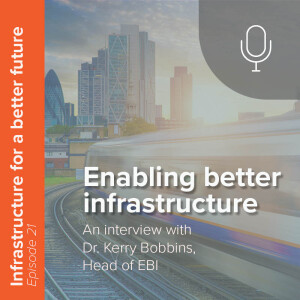
Wednesday Jun 04, 2025
Enabling better infrastructure
Wednesday Jun 04, 2025
Wednesday Jun 04, 2025
In this episode of our ongoing podcast series, Infrastructure for a Better Future, Te Waihanga Chief Executive Geoff Cooper speaks with Dr. Kerry Bobbins, Head of the Enabling Better Infrastructure Programme, convened by the Institution of Civil Engineers (UK). Kerry speaks about the challenges and best practice approaches to infrastructure planning as shown by different governments around the world.
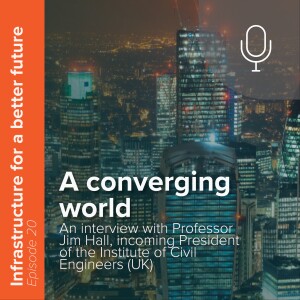
Tuesday Oct 08, 2024
A converging world
Tuesday Oct 08, 2024
Tuesday Oct 08, 2024
In this episode of Infrastructure for a better future, Peter Nunns, Acting General Manager – Strategy at Te Waihanga, speaks to Professor Jim Hall, who is the incoming President of the Institute of Civil Engineers in the United Kingdom. They discuss the Commission’s work on a National Infrastructure Plan for New Zealand. Hall emphasises the importance of strategic infrastructure planning, sharing best practices, and addressing political short-termism. He also discusses the challenges of forecasting long-term infrastructure needs, the impact of climate change on infrastructure, and the necessity of prioritising resilience and adaptation.
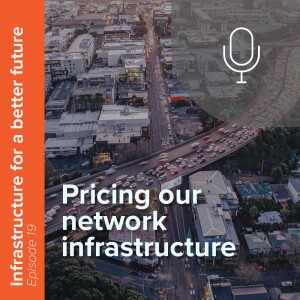
Friday Jul 05, 2024
Pricing our network infrastructure
Friday Jul 05, 2024
Friday Jul 05, 2024
We use a number of funding mechanisms to raise most of the money we need to pay for our network infrastructure services. Good infrastructure pricing is needed for efficient and sustainable infrastructure investment.
Sometimes funding approaches are obvious and connected to how much we use, like monthly electricity bills and mobile phone bills. Other times they are far less visible, like fuel excise that’s included in retail petrol prices or rates and taxes, which pay for many of the infrastructure services that we depend on.
In this episode of Infrastructure for a better future, Te Waihanga Director of Economics Peter Nunns speaks to PwC Executive Director Lynne Taylor about our recent research that looks at how pricing works in New Zealand’s four main network infrastructure sectors: land transport, water, telecommunications, and energy.
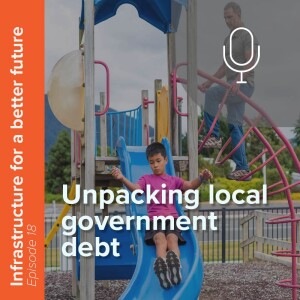
Tuesday Apr 30, 2024
Unpacking local government debt
Tuesday Apr 30, 2024
Tuesday Apr 30, 2024
How does local government debt finance infrastructure? What are the options and what situations should they be used? In this podcast episode, Te Waihanga Senior Communications Advisor Shelly Biswell speaks to Principal Economist Graham Campbell about our recent research that looks into if local government is debt constrained. We unpack this research and look at how local government debt options have been used in the past. We also look at constraints to these options and what they could mean for future infrastructure projects.
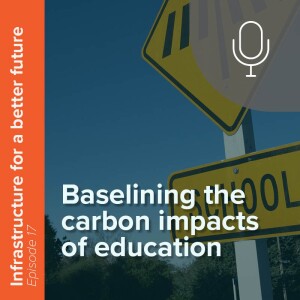
Monday Feb 12, 2024
Baselining the carbon impacts of education
Monday Feb 12, 2024
Monday Feb 12, 2024
In this episode of Infrastructure for a better future, we look at the Carbon Neutral Government Programme, which aims to accelerate emissions reduction in the public sector. In particularly, we look at the work being undertaken by the Ministry of Education. As part of this programme, the Ministry has baselined its emissions across two and a half thousand schools and kura - no easy task. The work is just beginning, but it's already made a difference, through projects like the boiler replacement programme - which has a target to remove all coal boilers by the end of June 2025.
Rebecca Robertshawe, Director or Projects and Programmes - Infrastructure Delivery at Te Waihanga, spoke to Tracy Finlayson, Programme Director - Emission Reductions: Schools and Kura at Ministry of Education, about the challenges of conducting this work, the successes, and what the next steps are for the programme.
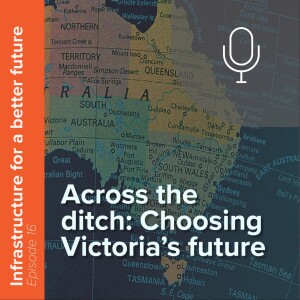
Wednesday Jan 17, 2024
Across the ditch: Choosing Victoria's future
Wednesday Jan 17, 2024
Wednesday Jan 17, 2024
Population growth is one of the biggest drivers of infrastructure services. More people, means more transport connections, more housing and more jobs. Last year, Infrastructure Victoria published research titled Choosing Victoria’s future that sketches out five urban form scenarios and makes the case that when it comes to an urban footprint, we have a certain set of choices that we can make. These choices lead to different social, environmental and economic outcomes – from the dollars in your bank account, to the resting heart rate on your watch, to the amount that we collectively choose to spend on infrastructure services.
In this episode of Infrastructure for a better future, Geoff Cooper, General Manager – Strategy at Te Waihanga speaks to Dr Jonathan Spear, Chief Executive at Infrastructure Victoria, about Infrastructure Victoria’s research.
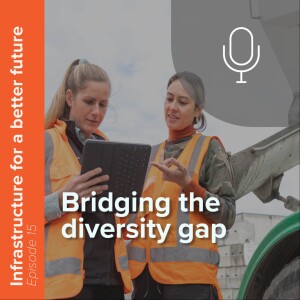
Friday Nov 03, 2023
Bridging the diversity gap
Friday Nov 03, 2023
Friday Nov 03, 2023
We know that teams that reflect our communities can listen better, understand better and better engage with our communities, and together can build better more resilientinfrastructure. So why is it that only 11% of infrastructure workers identify as women? In this episode, Te Waihanga Director - Leadership Nicola Richardson speaks to Stacey Mendonça, MNZM, Senior Quantity Surveyor and Estimator at Newcrest Construction, and Co-founder of the National Association of Women in Construction, about how we bridge the diversity gap and encourage more women into the construction sector.





